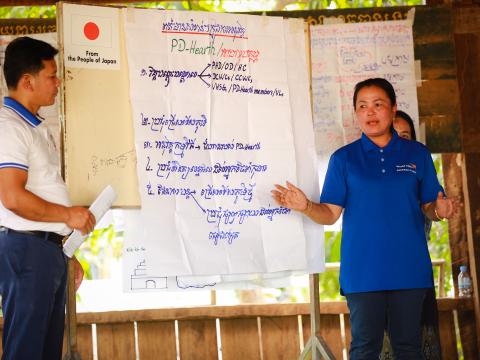Increasing local ownership in furthering child well-being

Local stakeholders’ regular meetings to discuss initiatives that boost children’s health and growth,
subsidies for poor households to improve sanitation and hygiene practices at home,
strengthened structure of mutual support among community members, especially the poor and those without timely access to health services,
increased cost-sharing practices in World Vision’s activities which reduces the communities’ reliance on external support,
beyond routine activities normally conducted in the past such as road and house construction, 27 target communes in Cambodia are now proactively and effectively planning annual budgets and activities to improve the well-being of their own communities and children.
This is considered one of the biggest wins of the Integrated Health, Nutrition, and Water, Sanitation and Hygiene Project (IHNWASH) funded by the Ministry of Foreign Affairs of Japan and implemented from 2020 to 2023 in Preah Vihear Province, Cambodia.
One key success factor for this significant change was the adoption of Commune Investment Plan to increase annual budgets at the community level, especially budgets dedicated to child nutrition.
Another equally important factor was the periodic exposure visits that enabled local stakeholders’ cross-learning from good models of local governments, health centres and water system management committees in other provinces. Not only could they observe the desirable quality of services, but they also had the chance to connect with people who can give them advice and guidance to deliver good impacts through similar projects when they go back.
As a result of IHNWASH Project implementation, the mindset, knowledge and practices of people, including mothers of children under 5, have now changed for the better through community-based nutrition improvement activities (including Positive Deviance Hearth approach), establishment of clean water and sanitation facilities (with 7 newly constructed water supply systems and Community-Led Total Sanitation activities), and mutual support fund that enables poor and remote households to timely access healthcare services.
Expressing his favourable impression of the project’s impacts, Mr. Ichitomo Taninai, Minister/Deputy Chief of Mission of the Embassy of Japan in Cambodia, said, "We are able to confirm the improved health and nutrition status of children together with the community ownership and project sustainability through the proactive follow-up actions by local stakeholders. It is a pleasure to have implemented this successful project as 2023 marks the 70th year of diplomatic relations between Japan and Cambodia."
World Vision East Asia’s Regional Leader Terry Ferrari said, “I've been meeting with families, hearing about how this project has changed their lives. It’s a great progress that's being made in this community. You can really see it on the smiles of all the children. I want to thank the government of Japan for making this possible.”